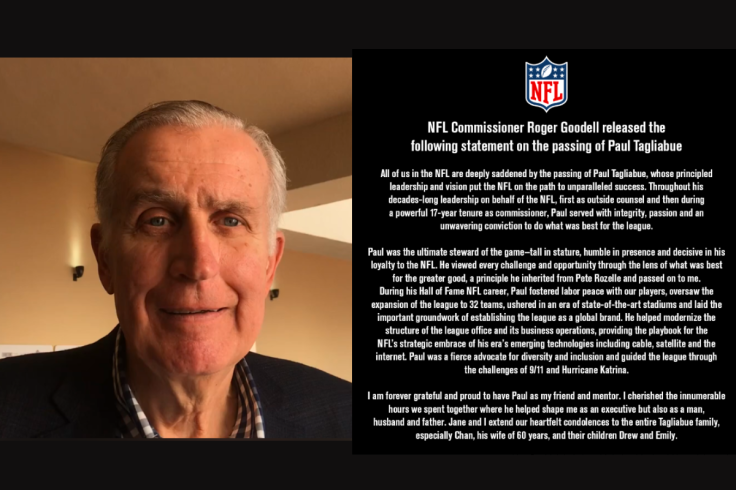NFL Mourns Paul Tagliabue, Architect of the League's Modern Era and Global Reach
Former commissioner remembered for expansion, equity, and steady leadership through crisis

Paul Tagliabue, the seventh commissioner of the National Football League and one of its most influential architects, died on Sunday at the age of 84. His family confirmed the cause of death as heart failure complicated by Parkinson's disease.
A Steward of Growth and Stability
Tagliabue led the NFL from 1989 to 2006, a period marked by dramatic expansion, labour peace, and global ambition. Under his leadership, the league grew from 28 to 32 teams, adding the Carolina Panthers, Jacksonville Jaguars, present-day Cleveland Browns, and Houston Texans. More than two-thirds of NFL teams moved into new stadiums during his tenure, many of which did not exist when he took office.
He also oversaw the launch of the league's own website and television network, laying the foundation for the NFL's digital and media dominance.
Jerry Jones Reflects on a Shared Era
Dallas Cowboys owner Jerry Jones, who entered the league the same year Tagliabue became commissioner, offered a heartfelt tribute. 'Paul Tagliabue's leadership helped shape the National Football League into the global institution it is today,' Jones said. 'He was a steady hand and a principled leader who guided the league through an unprecedented era of change, growth and success with great resolve and integrity.'
Jones recalled Tagliabue handing him the Lombardi Trophy after each of the Cowboys' three Super Bowl victories in the 1990s, calling it 'a great honor to have known Paul and worked with him as closely as I did.'
Crisis Leadership and Cultural Impact
Tagliabue's tenure included two of the most challenging moments in recent American history: the September 11 attacks and Hurricane Katrina. He cancelled games in the wake of 9/11, setting a precedent for other sports leagues. In 2005, he ensured the New Orleans Saints returned to their home city after being displaced by the hurricane.
He also helped repair fractured relations between owners and players, working closely with NFLPA executive director Gene Upshaw and Pittsburgh Steelers owner Dan Rooney. His efforts led to the introduction of free agency, a salary cap, and a substance abuse policy considered the strongest in major sports.
— NFL (@NFL) November 9, 2025
Championing Inclusion and Accountability
Tagliabue implemented the Rooney Rule, requiring teams to interview minority candidates for head coaching roles — a policy later expanded to front office positions. When he took office, the NFL had just hired its first Black head coach of the modern era. By the time he stepped down, there were seven minority head coaches in the league.
He later expressed regret over comments he made in 1994 downplaying the severity of concussions, acknowledging in 2017 that his language had been 'intemperate' and that better data was needed.
Legacy Beyond the Field
Tagliabue was inducted into the Pro Football Hall of Fame in 2020 as a contributor. In his speech, he said, 'We need to respect the players for having these qualities and for what they represent as leaders in sports and in society.'
Post-retirement, he served as chairman of Georgetown University's board of directors and was appointed by Roger Goodell to review the Saints' 'Bountygate' suspensions in 2012, ultimately overturning them due to procedural flaws.
He is survived by his wife Chandler, son Drew, and daughter Emily.
© Copyright IBTimes 2025. All rights reserved.





















